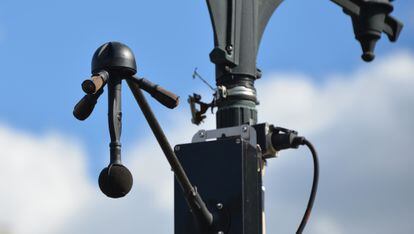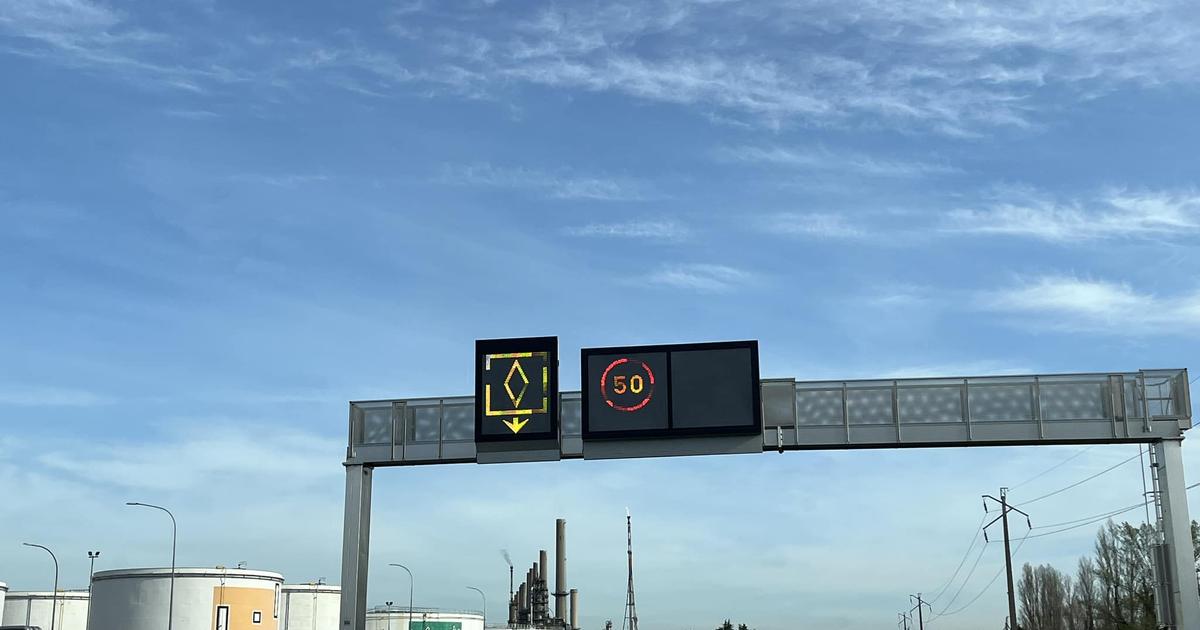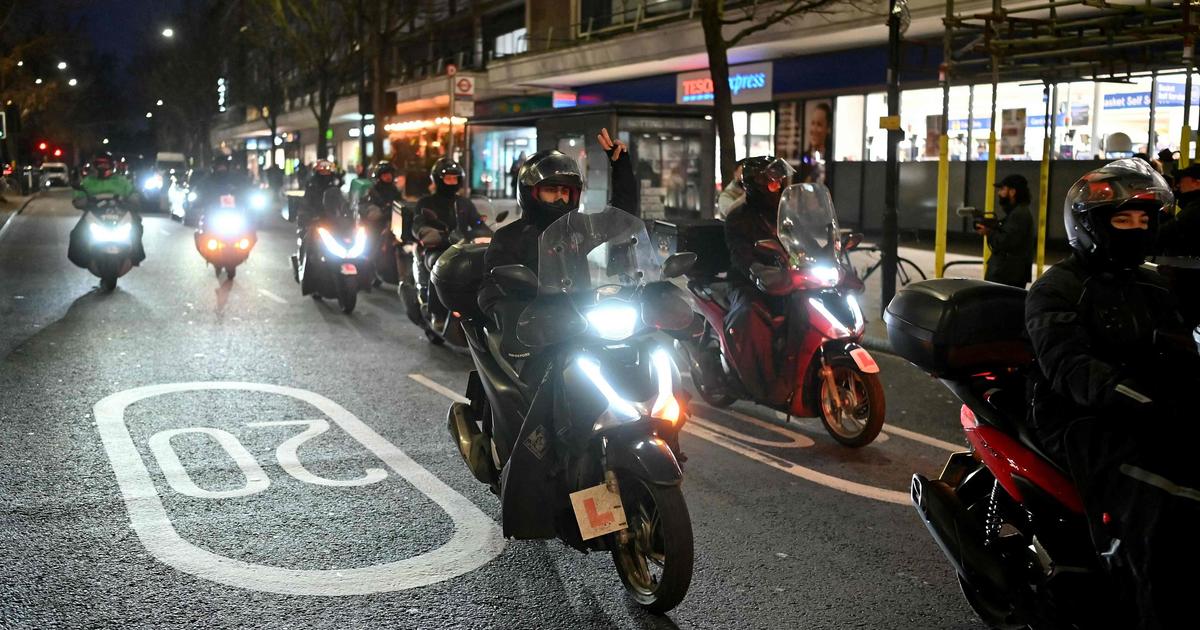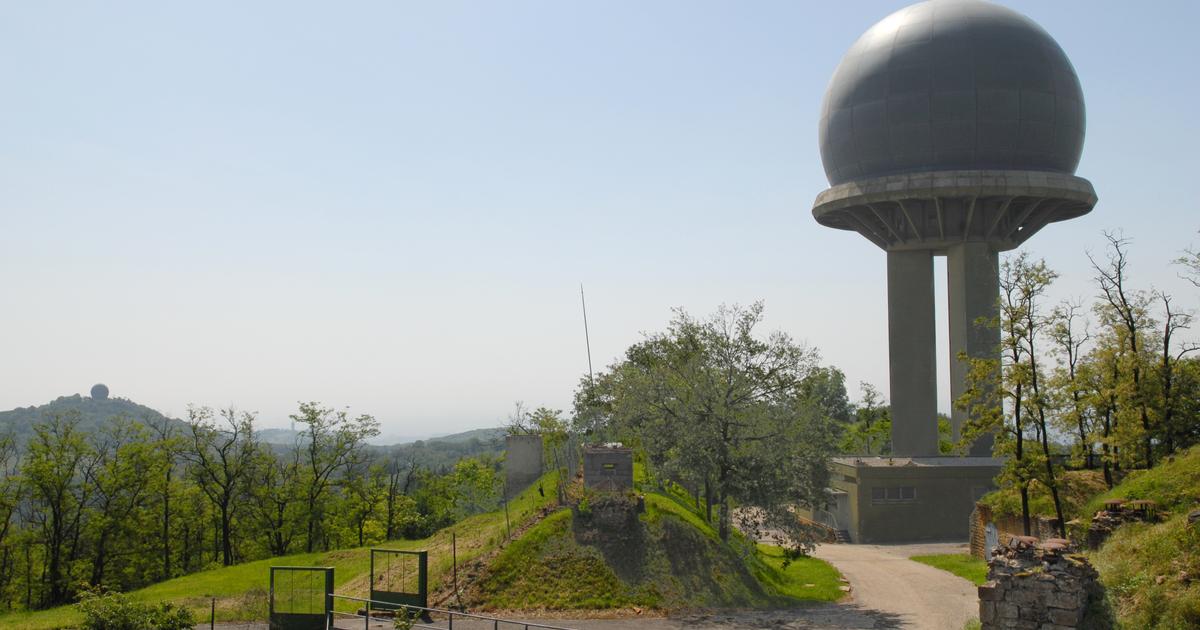One of the Medusa-type radars to be installed in France to measure traffic noise.
Do rigged motorcycles and fanatics have to make their vehicle's engines roar to the max on the days numbered? In France, it may be. Since this week, seven Gallic communities have participated in the experimentation of sound radars that seek to measure the noise level of certain vehicles in sensitive areas and fine those who cause noise pollution that has serious health and economic consequences - the noise causes 16,600 deaths premature deaths in Europe and 72,000 hospitalizations a year, according to the European Environment Agency - for citizens who suffer from it. Its promoters celebrate an initiative that they consider unique in the world. There is currently no similar project in Spain, as confirmed by a spokesman for the General Directorate of Traffic.
The experiment, which will last two years, began on Tuesday with the publication of a decree in the official gazette (the French BOE) and the inauguration of the first radars on a departmental road near Saint-Lambert. This small town in the Chevreuse Valley Natural Park, southwest of Paris, is one of the favorite routes for bikers,
quad
drivers and other similar vehicles, much to the chagrin - and annoyance - of residents and visitors to this wilderness area. privileged a stone's throw from the capital.
"It's a permanent background noise, every weekend," Saint-Lambert mayor Olivier Bedouelle told Franceinfo broadcaster. "Even in the morning and at night there are vehicles, and many motorcycles without a silencer that make a noise that can reach 80 and up to 100 decibels," he explained.
Bruitparif, a state agency that conducts technical evaluations of the noise environment, made several measurements last summer in the area to prepare for the installation of noise radars. Between 210 and 520 noise peaks were registered, mainly due to motorcycles. "Listening for miles around the passage of a motorcycle in which its driver has voluntarily modified the vehicle to make more noise is exasperating,"
Franck Olivier Torro, spokesman for the Ras le Scoot association , told
Le Parisien
newspaper, which seeks to reduce noise pollution in France.
According to the new decree, the radars - each time three different, not yet approved, from various manufacturers will be installed - must be located within urban areas, in places where the maximum speed is set at 50 kilometers per hour.
The devices, which have microphones and cameras to capture the license plate of the offending vehicle, must be located on the shoulder and will carry out an “automatic control of the level of noise emissions of the vehicles”, in accordance with the legal text.
It has not yet been definitively decided what the allowed decibel limit will be, something that will be set once the experimentation phase has concluded.
At the moment, it has been set at 90 decibels.
What is already known is what the penalty will be: a 135-euro fine, which will begin to be applied as the experimentation progresses.
Until now, the maximum noise level depends on each vehicle and is specified in the documentation that every driver must carry when he gets behind the wheel, in case the agents do a control.
The new radars should allow "to expand controls and improve their effectiveness," according to the Ministry of Ecological Transition, which promotes the project arguing health and economic reasons.
As the Minister of the Industry, Barbara Pompili, recalled in a statement, the “cost of noise for French society, especially due to the health effects linked to lack of sleep and the loss of value of the exposed homes, is estimated at 147,000 million euros per year ”.
From aujourd'hui, 7 collectivités testeront des radars sonores.
Une première étape pour lutter efficacement contre la presence excessive du bruit dans you see us!
Plus d'informations sur https://t.co/OGGRdc7Tnf pic.twitter.com/EfKty6vpoq
- Barbara Pompili (@barbarapompili) January 4, 2022
This figure corresponds to the calculations carried out last summer by the French Ecological Transition Agency (Ademe).
In its report, published in July, it revealed that most of this cost (66.5% of that social cost or 97.8 billion euros) corresponds to noise from transport, especially road traffic (54.8% of the total) , followed very far by rail (7.6%) and air (4.1%).
Also the World Health Organization (WHO) has declared noise as the second environmental factor causing more health damage in Europe, after air pollution, which is responsible for 40,000 premature deaths a year in France.
A public health challenge
The local deputy Jean-Noël Barrot, from the centrist MoDem party and promoter of a project that he has been preparing for more than two years, celebrated on social networks the beginning of an experiment that “puts France at the forefront of the fight against noise from the trafficking, a real public health challenge ”.
As he has explained these days in various media, the objective, rather than punishing offenders, is to dissuade them and end practices such as removing the silencers from motorcycles that are repeated in countries around the world.
“What we hope is to deter this ultra-minority behavior from those who modify their vehicle to create more noise.
It is only one piece in the set of answers that we want to contribute ”, declared Barrot.
One of them, however, received a strong setback last summer, when the president, Emmanuel Macron suspended "until further notice" another decree that implemented from 2023 the technical control required by the European Union for vehicles of two or three wheels and that it anticipated revisions of the brakes, wheels, lights and, also, of the noise they emit.
"This is not the time to screw up the French,"
Le Monde
quoted a government adviser.
The measure had provoked strong protests from motorcycle associations and its delay has been attributed in part to the election year that will culminate this spring with the presidential and legislative elections. In November, the Delegate Minister of Transport, Jean-Baptiste Djebbari, announced the implementation of alternative measures to these technical controls, including a premium for conversion to electric or less polluting vehicles of up to 6,000 euros and the sound radars themselves. Meanwhile, the Mayor of Paris, in the hands of the socialist candidate for the Elysée Anne Hidalgo, decided to delay until July the entry into force scheduled for this month of January of the end of free parking in the French capital for motorcycles.
Despite these sectoral protests, reducing noise pollution is something that has broad popular support.
Another study by Bruitparif indicates that 87% of the inhabitants of the capital region are in favor of a reinforcement of controls and penalties for motorcycles that are too noisy.
After all,
Le Parisien
recalled these days , the inhabitants of the capital lose almost 11 months of life expectancy due to noise.
Following Saint-Lambert, similar radars will be installed in a total of seven French towns, including Paris, Nice and Toulouse, in the coming days and weeks.
The idea, according to the Ministry of Ecological Transition, is that in the not too distant future they will be "throughout the national territory."
You can follow CLIMA Y MEDIO AMBIENTE on
and
, or sign up here to receive
our weekly newsletter








/cloudfront-eu-central-1.images.arcpublishing.com/prisa/3YLSYR3X44TA3DIGQGBH7SNU5M.jpg)






